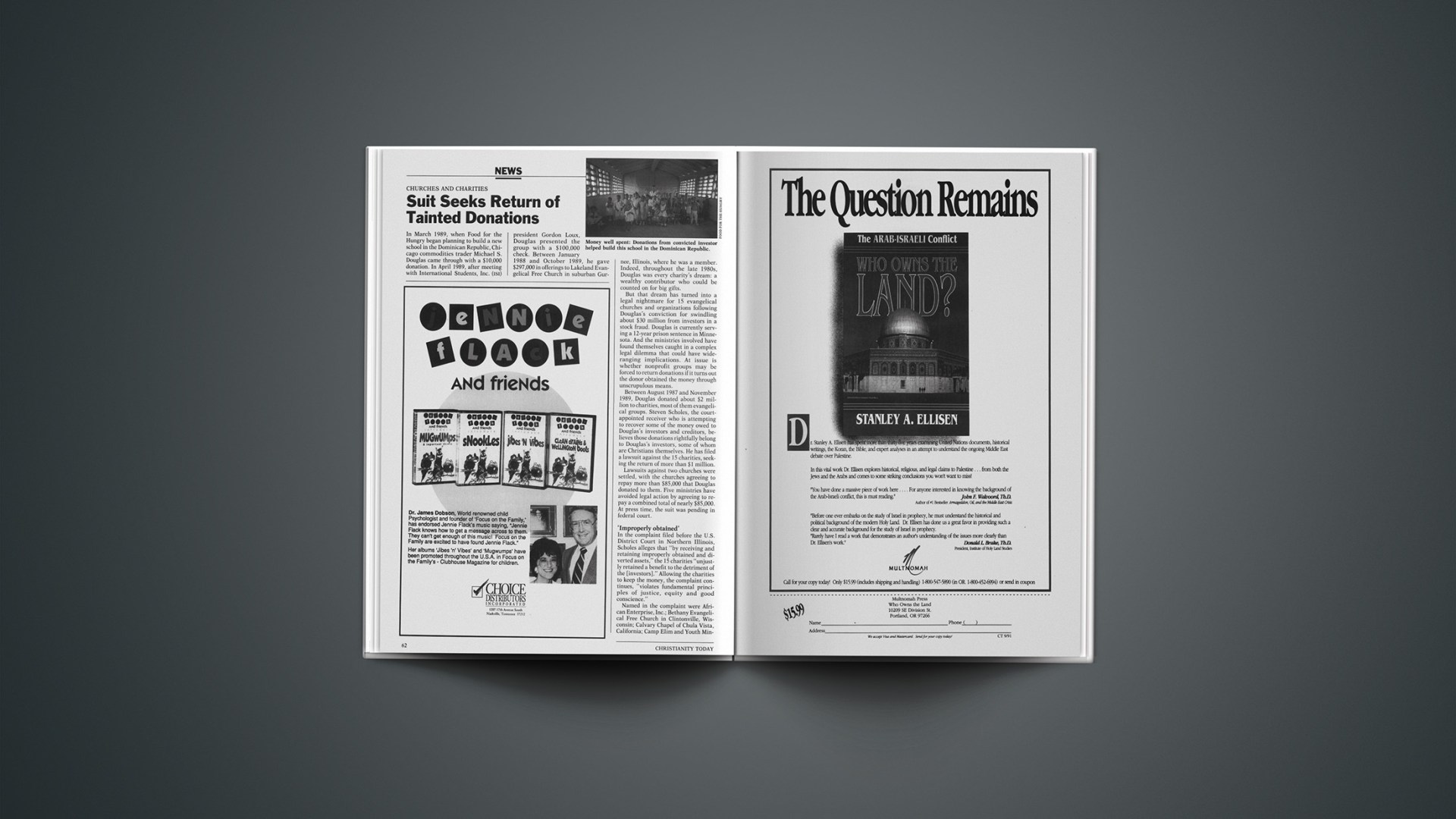In March 1989, when Food for the Hungry began planning to build a new school in the Dominican Republic, Chicago commodities trader Michael S. Douglas came through with a $10,000 donation. In April 1989, after meeting with International Students, Inc. (ISI) president Gordon Loux, Douglas presented the group with a $100,000 check. Between January 1988 and October 1989, he gave $297,000 in offerings to Lakeland Evangelical Free Church in suburban Gurnee, Illinois, where he was a member. Indeed, throughout the late 1980s, Douglas was every charity’s dream: a wealthy contributor who could be counted on for big gifts.
But that dream has turned into a legal nightmare for 15 evangelical churches and organizations following Douglas’s conviction for swindling about $30 million from investors in a stock fraud. Douglas is currently serving a 12-year prison sentence in Minnesota. And the ministries involved have found themselves caught in a complex legal dilemma that could have wide-ranging implications. At issue is whether nonprofit groups may be forced to return donations if it turns out the donor obtained the money through unscrupulous means.
Between August 1987 and November 1989, Douglas donated about $2 million to charities, most of them evangelical groups. Steven Scholes, the court-appointed receiver who is attempting to recover some of the money owed to Douglas’s investors and creditors, believes those donations rightfully belong to Douglas’s investors, some of whom are Christians themselves. He has filed a lawsuit against the 15 charities, seeking the return of more than $1 million.
Lawsuits against two churches were settled, with the churches agreeing to repay more than $85,000 that Douglas donated to them. Five ministries have avoided legal action by agreeing to repay a combined total of nearly $85,000. At press time, the suit was pending in federal court.
‘Improperly Obtained’
In the complaint filed before the U.S. District Court in Northern Illinois, Scholes alleges that “by receiving and retaining improperly obtained and diverted assets,” the 15 charities “unjustly retained a benefit to the detriment of the [investors].” Allowing the charities to keep the money, the complaint continues, “violates fundamental principles of justice, equity and good conscience.”
Named in the complaint were African Enterprise, Inc.; Bethany Evangelical Free Church in Clintonville, Wisconsin; Calvary Chapel of Chula Vista, California; Camp Elim and Youth Ministries of Haiti; Food for the Hungry, Inc.; Gospel Revival Ministries of Michigan; Heart Cry International of Illinois; Hindustan Bible Institute, Inc., of California; ISI; Lake Forest (Ill.) Academy; Lakeland Evangelical Free Church; Operation Brotherhood West Center of Illinois; Proclamation International of Pensacola, Florida; Trinity College and Trinity Evangelical Divinity School of Deerfield, Illinois; and World Vision, Inc.
Representing nine of the charities is Chicago attorney Timothy Klenk, a past president of the Christian Legal Society, who says the case could have an adverse effect on all charities and churches. If Scholes is successful, Klenk told CHRISTIANITY TODAY, “charities would have a hard time knowing that any of the gifts they have received wouldn’t have to be returned. It would almost put charities in the position where they would have to check into the financial condition of a donor before they accepted large gifts. And the question is, to what extent could they be expected to make an analysis of a donor’s financial condition before they accepted the funds?”
Payback Problems
All of the charities have already spent Douglas’s money, Klenk says, raising the further problem of from where they would come up with the funds to pay back the creditors: from other donations, from general ministry accounts, or from a loan. Many of the charities named in the suit say they would be ruined financially if forced to refund donations that have long since been spent on ministry projects.
For example, Proclamation International, a ministry to equip indigenous Christians in developing countries, is being asked to return $51,000 that it sent to Uganda. Director Don Dunkerley says his group would be in “serious trouble” if the charities lose.
ISI president Loux says he feels religious ministries are being unfairly singled out in this case. “I do think there is a parallel to the politicians that have accepted money from Charles Keating, and yet there doesn’t seem to be any push from the SEC [Securities and Exchange Commission] or anybody else for the politicians to give back the money they received,” he says.
“We accepted the money in good faith. We spent the money in good faith. There is no money left,” Loux said, adding that if the charities should lose the first legal round, he is committed to pursuing appeals through to the highest court.
By Kim A. Lawton.










